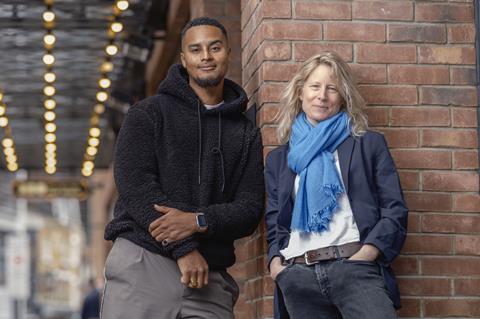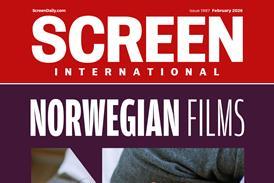Abdou Cissé discovers a common obsession with football talking to Wicked Little Letters director Thea Sharrock, and asks her about multitasking across projects, directing actors and leaping from theatre to film

Thea Sharrock made her name initially as a theatre director, working with Southwark Playhouse before becoming artistic director of London’s Gate Theatre. She directed Daniel Radcliffe in the 2007 West End revival of Equus, before taking it to Broadway, then moved into TV with The Hollow Crown, making her feature directing debut in 2016 with Me Before You, which grossed $12.3m (£9.7m) at the UK and Ireland box office and more than $200m worldwide. Her most recent credits are both for Blueprint Pictures: Wicked Little Letters, starring Olivia Colman and Jessie Buckley, which grossed an almost-identical $12.2m (£9.6m) in the UK and Ireland; and Netflix football drama The Beautiful Game, starring Micheal Ward and Bill Nighy.
Abdou Cissé is a writer/director from south London whose first short, 2019’s Serious Tingz, was nominated for a British Independent Film Award (Bifa). One half of ad agency Abdou & Akwasi (clients include Apple and Nike), Cissé made his TV directing debut with BBC series Grime Kids and worked as a second-unit director on season two of Gangs Of London, while his 2023 short Festival Of Slaps was Bafta-nominated and won the Bifa. He is currently developing two features, including Voice Of Reason with BBC Film.
Sharrock talks to Cissé — both Arsenal FC fans — over Zoom, a few days after meeting for the first time at their photo shoot for Screen International.
Abdou Cissé: I want to start off with a few fun ones because I know you’ve probably been asked every question under the sun when it comes to features and plays and stuff. But from our conversation last time you mentioned being a football fan, and you’ve made a whole film to do with football, so I wanted to kickstart it on a lighter note: do you prefer Arsenal’s current manager, Mikel Arteta, or former manager Arsene Wenger?
Sharrock: Oh my gosh. I was prepared for easy questions. That’s tough, man. Also, that’s a question nobody’s asked me, as bluntly as that. It’s going to take a bit of time to choose anyone other than Wenger. Twenty-two years is a long time. He changed not just my club, but [there’s] the discipline he brought to the industry. He changed the culture. Arteta doesn’t need to do that — although I suspect he could. Let’s have this conversation in five years’ time and see how we’re feeling.
Cissé: I feel, as directors, not only are you there to help shape the story, but also build a culture on set. If you were to compare yourself to a football manager in terms of your directing style, who would it be?
Sharrock: I grew up with Wenger and he was a huge figure in my life. When I worked in theatre, I used to parallel my job with his. And I used to feel a real sense of frustration that, at the end of the day, in the moment when it mattered the most — the live performance — that was where our jobs differed. In the prep of a show, and for him of a game, you can tinker away. You deal with your cast as a team, and your crew. You learn how to people-manage.
I used to feel so envious when I would watch games and watch a manager on the touchline be able to make substitutions and communicate with them in the moment, whereas as a theatre director you can’t go in at half-time and say, “Guys, we’ve got to pick it up, you are not responding to the audience here.” Because there are certain unspoken rules you don’t mess with.
As a film director, you can do that to a degree, because you’re live with your people. You’re on the touchline with them. And often, that is the most exciting moment, when you know how careful you must be with every actor. Every actor, like every child, is unique, and they are different from one hour to the next, one day to the next, one project to the next. But to answer your question, I’m not smart enough to be Wenger, and I’m not French enough. I’m too emotional. I show it more than he does. So, I’m going to go [ex-Liverpool manager Jürgen] Klopp.
Cissé: That’s good.
Sharrock: There are a few actors I might give you their numbers to ask, “Is this a fair parallel or is she way off?” But only the football [fan] ones would know.
Cissé: Obviously, with theatre, when it’s live, you can’t interject and be like, “Let’s go again.” There is no second time around.
Sharrock: In theatre, you’ve got to hold on. You’ve got to wait till the end, or the next day, to feel you can in some way affect the next day’s performance. Whereas in film, it’s the opposite. You’ve got producers patting you on the shoulder, looking at their watch going, “This is costing me money. You’ve got another 10 minutes. What are you going to do?” The disciplines are very different.
Cissé: That leads me to my next question, which is: when you made that leap to film, what would you say you learned the most about yourself during that time?
Sharrock: The thing I learned very quickly, and I don’t know how conscious I was of it but I’m very conscious of it now, [is] I am an actors’ director. I don’t do the job, ultimately, for me, I do it for an audience. I have always seen myself as a facilitator between the script, wanting to get the best out of that, the performers, wanting to help them give the best of themselves, and bringing those things together.
I learned that very quickly through changing the medium, because some things remain the same, and some things are so different. What remains the same is how much an actor needs you. In theatre they are so exposed by the live audience. But when you get it right, that feeling is golden. In film, there are hundreds of people on set and you’re trying to make sure your actor is not worrying about them. Again, it’s the same as parenting. At the end of the day, you’ve got to keep them safe.
Cissé: One hundred percent. I’m in this space right now where I’m trying to work with actors a lot more. I was literally rehearsing a scene out ofTriangle Of Sadness just now.
Sharrock: Another thing I learned about myself very quickly, and I hold it close, is to never, ever be afraid to say to an actor, “I don’t know.” Again, it’s like children. Children know if you’re not telling the truth. What I always say to [actors] is, “I don’t know, but I’m going to find out.” And sometimes in that space, you both go away and do homework and you will come up with something, because you’ll want to find that answer for them as well as yourself. I would speak in the same way about your collaborators, your HODs.
Cissé: That’s so interesting because there’s this perception of how a director works with actors or how a director is on set, that you need to always know all the answers. One of the best pieces of advice I ever got was to tap into the knowledge of the people around you.
Sharrock: Absolutely. It’s a job of decision-making, constant decision-making. And part of the skill comes from just doing it and doing it.
Cissé: With The Beautiful Game and Wicked Little Letters, there was a bit of overlap, in terms of those productions, right?
Sharrock: Yes.
Cissé: In a world where multitasking is the norm, whether you’re pitching your new feature while trying to work in TV or shooting a commercial to make sure you’re paying the bills, how were you able to separate and maintain the creative vision for those two projects while they were happening?
Sharrock: Number one is working with the best producers you can, because ultimately, they are your best ally. The other thing is, trust your instinct. Another big thing is try to work with people who are better at their job than you could ever be. Those people are golden — look after them, show them how much they mean to you and they’ll keep giving. At the end of the day, it’s a people business. Making movies is hard. Making art is hard. It’s hard enough when you’re surrounded by people you love. It’s triply hard if you’re fighting with anybody. So pick your people as carefully as you pick your battles.
Cissé: When it comes to your films, is there a common denominator that links them, because, in terms of genre, they’re varied?
Sharrock: I was very similar in my theatre work. I rarely worked with the same playwrights. I did sometimes work with the same actors if I was lucky enough. But each show was very different to the last. The thing that links for me is always the actors and the stories you’re telling. I am drawn largely to people’s stories and there needs to be a degree of believability and truth in them. I feel I have a huge responsibility when I take on a job. I have a huge responsibility to my actors. I love to work within a collaborative universe.
Cissé: If your son turned around and said, “Mum, I want to be a director,” what would be the top three pieces of advice you’d give him?
Sharrock: I would say, “Follow your heart.” I would say, “Trust your instinct.” Can I say four?
Cissé: You can make it five if you want.
Sharrock: “Keep your friends close and look after them.” And, “Be brave.”
Cissé: Love that. What would you say for him to watch out for?
Sharrock: I would say, “Never ever kick yourself when you make a mistake.” Because what you learn from your failures will only make you stronger. It’s something to build on. You’ll only get better through them. That’s how we learn.
Cissé: One hundred percent.
Sharrock: So what football manager are you then?
Cissé: I’m still trying to work it out. You said such a good one. Klopp’s so tactical and so precise, but his players love him. I feel Fergie [Alex Ferguson, former Manchester United manager] ruled with fear, whereas with Klopp, he rules with love. I would love to say something similar.
Sharrock: Listen, you’ve started your journey and it’s amazing how far you’ve gone already. You’ve got a long way ahead of you. You’ll find your own manager.
























No comments yet